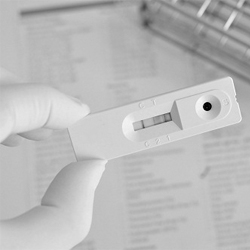TruQuick™ Legionella
Legionellosis is a serious pneumonia caused by bacteria of the genus Legionella assigned to the family Legionellaceae. This family now includes 48 species and over 60 serogroups. Approximately 20 species are implicated in human disease. The overwhelming majority of Legionella infections are caused by Legionella pneumophila. Legionnaires’ disease is the major clinical manifestation of Legionella infection although extra-pulmonary infection and non-pneumonic disease like Pontiac fever occur. The name Legionella pneumophila was derived from the dramatic outbreak at the 1976 American Legion Convention in Philadelphia.1
Legionella pneumophila is responsible for approximately 90% of infections, and of these, over 80% are due to a single serogroup, serogroup 1.2 Legionella bacteria are small faintly staining Gramnegative rods with polar flagella. Legionella bacteria have a widespread distribution in both natural and manmade aquatic habitats. They are readily found in fresh water, cooling towers and potable water systems. The organisms can survive in a wide range of conditions, and temperature is a critical determinant for Legionella proliferation. Nosocomial infection is particularly associated with colonization of hospital hot water system by Legionella.
- Open the pouch and remove the device. Once opened, run the test immediately.
- Swirl urine gently to mix before testing.
- Add 4 drops of swirled urine sample (approx. 100 μL) to the sample well.
- Wait for the colored line to appear. Read the results at 15 minutes, do not interpret the results after 20 minutes.
- Diederen BMW. Legionella spp. and Legionnaires’ disease. J Inf. 2008;56:1-12.
- Helbig JH, et al. Pan-European study on culture-proven Legionnaires’ disease. Eur J Clin Microbiol Infect Dis. 2002;21:710-716.
- Fields BS, et al. Legionella and Legionnaires’ disease: 25 years of investigation. Clin Microbiol Rev. 2002;15:506-526.

